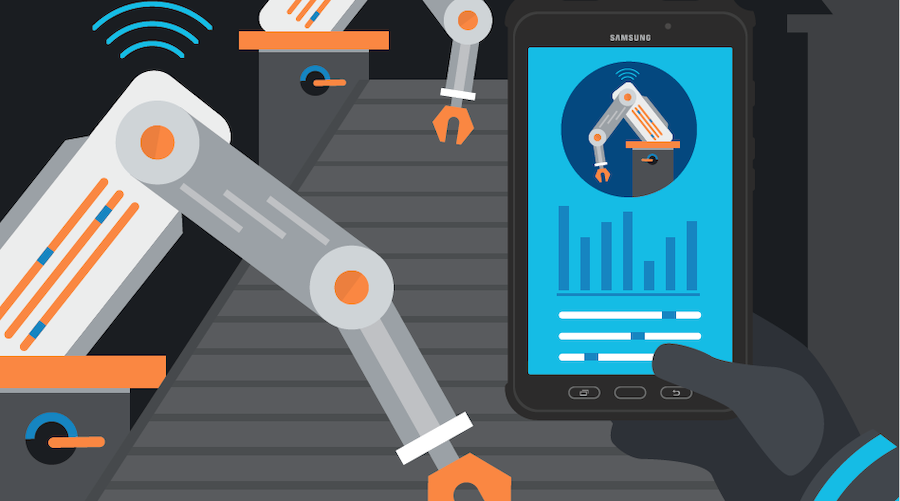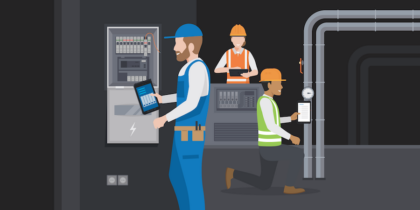The smart factory envisioned by Industry 4.0 hinges on a digital revolution, where Industrial Internet of Things (IIoT) and other data generated by embedded devices and other manufacturing processes, drive all operations. This data is constantly used by machines to run production on mostly autonomous cycles, alerting manufacturing personnel as and when needed. Enterprises that can leverage data in this way can improve manufacturing uptime and profitability and gain a competitive edge. Today’s lean manufacturing requires seamless task management from factory floor workers, plant managers and beyond. Mobile devices take away the painful chores associated with task management (paper copies in triplicate, anyone?) and deliver powerful processing capabilities on the go. Here are six ways that mobile devices can modernize task management in manufacturing enterprises.
Track Inventory
Mobile devices such as the Samsung Galaxy Tab Active2 can perform barcode scanning for easy location and tracking of the raw materials needed for a certain batch run. Such inputs are an especially valuable component of Just-in-Time inventory management, as workers across multiple plants can keep an eye on movement of critical supplies and schedule production accordingly. Supply chain management apps can send out alerts about status of shipments to workers’ smartwatches (shipped, en route or delivered) once products are scanned. Inventory management software can also be used to automatically trigger supply orders if key products are running low.
Monitor Workstation Productivity
Tracking work orders becomes a cinch with tablets such as the Tab Active2. Secure facial recognition technology ensures only qualified workers can access the machines. The workers can view relevant training videos to complete complicated processes, take ownership and update work orders, and even use the video capabilities of the mobile device to record production challenges.
Receive More Efficient Maintenance Alerts
Smart factories gather volumes of data from embedded machines, continuously keeping a pulse on key metrics. A sensor on a motor, for example, can track its temperature constantly. Plant personnel can then set thresholds for when the system should trigger alerts. A machine overheating, for example, can trigger an alert to a worker’s smartwatch when the temperature goes beyond a certain preset number.
Modernize Your Factory With Mobile
Get your free guide to the mobile technologies that will accelerate your smart factory journey. Download Now
Schedule Proactive Maintenance
Smart factories that run on an autonomous loop use data to make systems progressively more intelligent. As machines fail, that data is entered into a machine learning program that uses past history of machine behavior to predict what the future will bring. Indeed, manufacturing personnel can monitor the health of equipment by keeping an eye on the data being generated by the associated sensors. The machine learning models that process this data can alert personnel about needed maintenance before the machine actually breaks down, thus maintaining an important key performance indicator: manufacturing uptime. At any time, authorized managers and workers on the plant floor can use mobile devices to scan equipment and obtain updated work history, access schematics and stay ahead of maintenance schedules.
Enable Versatility
Team leaders can work on a variety of daily management tasks, such as managing operator breaks, taking charge of work orders, tracking sales orders and even pulling up quality control reports — all on the go. Samsung’s Galaxy range of phones and tablets come with Knox Security, which can be combined with biometrics such as iris scanning or facial recognition to ensure that sensitive enterprise data is accessible only by authorized personnel. Mobile devices with defense-grade Knox security empower management personnel to perform their tasks on the go while being assured that sensitive and proprietary company information remains secure.
Access Powerful Computing on the Go
For those mobile devices such as the Galaxy Tab Active2 deliver impressive computing power with 3GB of RAM and up to 256GB of storage. The 4,450mAh battery lasts all day long, liberating shop floor personnel to travel the production floor as needed. Workers and plant managers can leverage the unique advantages of mobility to modernize task management and improve efficiencies in manufacturing. By delivering computing and data processing on the go, mobile devices anchor the smart factories of tomorrow. Companies that adopt such mobile solutions are poised to gain a competitive advantage today.
Learn more about using mobile technology to modernize your factory with our free white paper.







